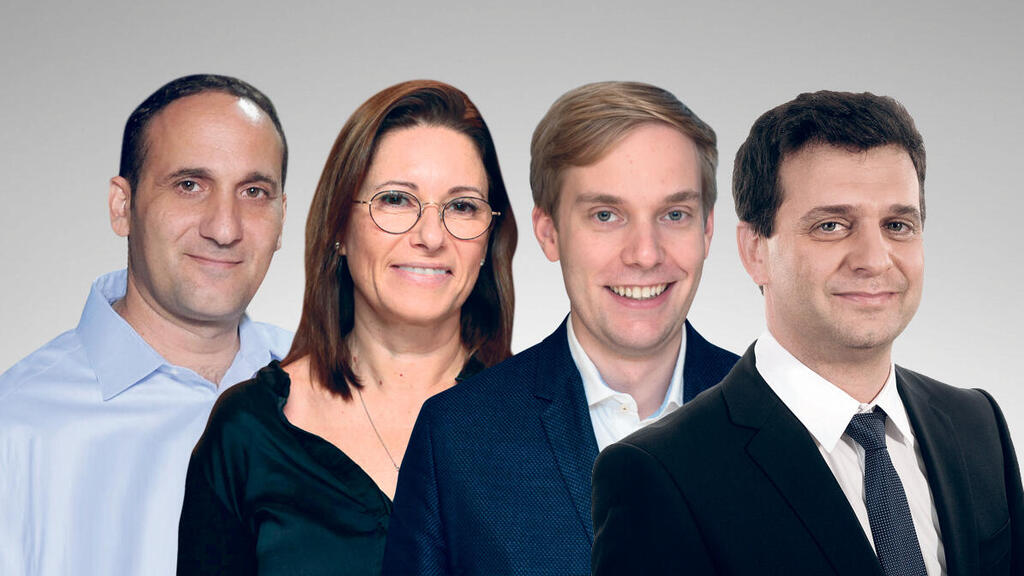
Analysis
"A panic sale of high-tech companies will begin in the second half of 2023"
The big question of 2023 is what will win out - the need to make investments or fear?
It seemed like everyone had a crystal ball in their office during the high tide in high-tech. Investors and entrepreneurs would explain, for example, how there is no reason for the tide to stop because of the "digital transformation" and all that goes with it.
For the first article in the series - click here .
But in recent months, the feeling is that these coveted balls have all gone missing. There is not a single conversation with an investor in which the mantra "I don't have a crystal ball" is not repeated in response to the question of what will happen in the field of investments and mergers next year. When the trend is positive everyone is riding it, the question is what to do when the trend reverses.
No one is ready to commit to what will happen in 2023 in the fundraising market, but it will surely be very interesting there due to several conflicting trends. On the one hand, the macroeconomic environment is challenging, fear is taking control of more and more layers and sectors, and at the same time the interest rates are already starting to be attractive enough, as is the bond market, making low-risk and solid investments intriguing once more after almost being wiped off the map in the last two decades.
Beyond that, the poor performance of the stock exchanges reduces the appetite for risk and also the ability of investors to commit new sums in favor of investments in the private sector. These investments must be balanced in the portfolio with those in the public sector, which suffered a severe blow.
Institutional bodies, in Israel and abroad, are beginning to signal that they are taking their foot off the gas pedal. For example, Haggai Schreiber, Deputy CEO and Chief Investment Officer at Phoenix, recently told Calcalist that he has stopped investing directly in private technology companies in growth stages. The Pennsylvania Teachers' Pension Fund has decided to re-examine its decision to invest in the new fund raised by Insight Partners, which has invested in dozens of Israeli high-tech companies.
But on the other hand, venture capital funds and private investment funds are sitting on an unimaginable amount of almost $300 billion that they have raised in recent years. This is a historically unprecedented amount, which, even if it can not all be used, will push the funds into feverish activity in the coming year. They cannot deposit this money in the bank and receive interest on it because the mandate given to them is based on a promise to locate companies that will become the cutting edge of technology in the future. The big question is what will win out - the need to make investments or the fear?
The answer is divided according to the stage of life of the company. In early-stage investments, the reality hasn't changed much: the numbers dropped slightly and have returned to sanity, meaning that a team of youngsters which has just been released from Unit 8200 can no longer receive $20 million right away, but "only" $5 million and the value doesn't really change dramatically in these numbers. For startups at the beginning of their journey this is actually an excellent time to mature and develop without background noise and when manpower actually becomes available and cheaper.
"Funds that specialize in early stages are still ready to invest a lot of money and the change is in our expectation from the companies: the money should be enough to last for more time and they will have to meet very clear milestones. But we take more time, we don't need to prepare investment agreements overnight, we are also not the only ones, everyone is analyzing companies more deeply," said Yodfat Harel Buchris, Managing Director of Blumberg Capital fund in Israel, which specializes in very early stage investments.
In her opinion, the angels will not run away from the investments either because after the high tide years when huge funds were also "pushed" into Seed and pre-Seed investments, the space is relatively open again and they will be able to get more holdings for their money.
The main challenge is in the more mature growth companies, which must be issued or sold in order to generate a return for the funds that invested in them. Those unicorns got used to being wooed by investors in the high tide years. Most of them are still courted, but the numbers are different and they have had trouble digesting them in the last year, even if throughout the whole year they have seen public companies that are similar to them and sometimes almost twins like Forter and Riskified or Next and Hippo, collapse to single-digit revenue multiples.
Related articles:
"In 2022 we were definitely less active in investments, in Israel and in the world in general, and this is similar to the other entities - we returned to pre-Corona levels," said Teddie Wardi, Managing Partner at the Insight Partners fund, which invested in many Israeli unicorns and led about 30 new investment rounds in the past year in Israel. "But we still believe in the big and general trend that guides us for the next 5-10 years, which says that companies in the field of cyber, corporate software, and artificial intelligence will continue to grow and get stronger. It will simply happen more slowly than it has in the last two years. Therefore, also in regards to the revenue multipliers based on them by which the value was determined, the clock went back to the levels of 2016. The multipliers dropped by 50% in the cloud companies that are traded and this will happen in the private market as well, but there are still many companies that are selling, growing and they have not run out of money.
"It is difficult to predict, because every crisis is different, even though Insight has been operating in the market for more than 20 years and has already experienced crises. We continue to actively invest and look at everything. We see many more interesting potential deals in Israel and there will also be new unicorns. My guess is that 2023 will be similar to 2022 in terms of the scope of investments and the amount of transactions."
"We definitely feel that the amount of money in the market is decreasing, investors who previously invested in venture capital funds are transferring the money to bonds and it will obviously be more difficult to raise the next round," said Amos Haggiag, co-founder and CEO of the software unicorn Optibus, which raised $100 million at a valuation of $1.3 billion in the spring of 2021.
"There are still calls that come in from investors on a daily basis, they are good at contacting companies and making sure to maintain contact, but it's not like they come and tell you to 'take money'. It's clear that multiples have gone down, so it's difficult for companies to reach a higher value than before. If growth companies used to double or triple the value in each round, now it doesn't happen even if the company is growing fast," admits Haggiag.
So there is still a lot of money in the market and it will be distributed in the coming year mainly to two types of companies: those that continue to grow rapidly and therefore may even be able to avoid a "down round", simply because their revenues have grown enough in the two years that have passed since the fundraising to justify a value similar to the previous fundraising or even slightly higher.
The second group are good companies, which show that their business model works and even manage to generate profitability or get close to it, but their growth has been dramatically affected. Investors will pounce on such companies and leverage their desperation for capital for a large investment at a relatively low valuation. There is a lot of talk among funds today about raising side funds, known as opportunity funds, which are designed to take advantage of exactly such situations - good, mature and large companies that will need large sums to continue operating.
Private investment funds such as Blackstone, for example, which entered Israel with great fanfare a year and a half ago and since then has only made two investments that are not large in the terms of the fund, are waiting with eager anticipation for such companies. The fund, which often invests sums of hundreds of millions and even billions in a single company and sometimes also acquires full ownership in them, is waiting to strike and invest in a big unicorn that has gone a long time since its last funding round or whose IPO plans have gone wrong, such as eToro, Yotpo, Redis or Forter. Funds like Blackstone are also waiting to see share prices bottom out in order to make acquisition offers and return to the private sector the good public companies that are trading at low multiples.
Alongside Blackstone, in the past year, other huge investment entities entered the country that previously were not interested in Israel or at least not on a regular basis. In the meantime, the private equity fund General Atlantic, the high-tech investment arm of the hedge fund Third Point, and the large European Index fund that specializes in early stage investments, have all expanded their local presence. All of these are also looking to enter the Israeli companies that were too expensive in 2020 and 2021 and have enough money to lead rounds of hundreds of millions of dollars.
On the other hand, a slowdown is expected in the activity of Tiger Global, the American investment body that became synonymous with the recruitment frenzy of 2021, when it made an investment almost on a daily basis. Today, entrepreneurs who received money from Tiger, who is used to investing in public companies, find themselves without the partner who led the activity in Israel - John Curtis, who left to start his own fund. At the same time, there may also be a slowdown in the activity of the veteran and highly regarded venture capital fund Sequoia, after Carl Eschenbach, a partner who sits on the boards of many Israeli unicorns, announced his departure last week.
Against the background of all this, it is not impossible that the recruitment volumes of startup companies in 2023 will be higher than those of 2022 due to potentially multiple mega-deals of hundreds of millions of dollars. The best example is the raising of $304 million by TripActions at a valuation of $9.2 billion, which was higher than the value of the previous round, although some of the money was raised through debt and other instruments. In these new types of transactions, there will be a lot of fine print and conditions that transfer all the power to the investors, often at the expense of the entrepreneurs and employees.
One of the things that preoccupies both the companies and their investors more today is the fear of a "down round". As soon as a company raises at a lower value than the previous round, an investor must update the new value in the books and this spoils the returns that the funds present to their investors. Bad returns today mean difficulty raising a new fund tomorrow. No one wants to start rolling this snowball, so it is likely that we will see more rounds that will have an element of debt and conditions to guarantee a minimum return to the investor in every scenario, and this to keep the value as close as possible to that of the previous fundraising.
Another type of transaction that will be common in the coming year and we have already seen in 2022 is the so-called "continuation transactions", meaning the transfer of ownership in companies that have already exited through an IPO or sale. For example, already this year the volume of transactions of this type reached a historical record of $30 billion with the sale of the public company Tower to Intel for $5.4 billion, the IPO of Mobileye, which was previously sold to Intel at a value of $16.5 billion, and the sale of the public ironSource for $4.4 billion to Unity.
Investment funds are beginning to feel the pressure to realize their holdings, both because there were fewer exits in the last year and because in some cases their investors are already asking to get their money back. It is estimated that in 2023, especially towards its second half, many will be pushed to search for exit routes that will go through either other funds that will take advantage of the opportunity or the IPO market.
And here we come to the one forecast that is almost the only consensus for 2023: the IPO market will remain closed. Historically, during periods when the IPO market was closed, there was a boom in the mergers and acquisitions market, which is considered the next alternative in the exit strategy of venture capital and investment funds. However, contrary to expectations, not only was there no increase in this activity in 2022, but even a decrease. According to the data of Professor Jay Ritter from the University of Florida, who follows the initial public offering market on Wall Street, a low like the one in 2022 has not been seen since 1990. Only 37 companies (not including SPACs) were issued in 2022, raising a cumulative amount of only $7 billion.
One of the most prominent and large IPOs of the year on Wall Street was that of Israel’s Mobileye, which raised about a billion dollars at a value of $16 billion, but most of the transactions were small, raising tens of millions of dollars. Several companies, including the Israelis companies Pagaya, Selina and SatixFy, arrived at Nasdaq after the completion of a merger with SPAC companies, but eToro, for example, chose to remain private and not to complete the IPO at a lower value than planned.
Despite the drought in the IPO market, the number of mergers and acquisitions of Israeli companies plunged from 99 deals in 2021 to only 59 in 2022, according to data from PWC Israel. The average deal size decreased even compared to 2019, to $105 million.
In fact, the acquisitions market in the high-tech industry behaved in the past year exactly like the residential housing market in recent months - the buyers waited for the prices to drop, while the sellers did not want to accept the new prices. In the coming months this game of chicken is about to come to an end and it is estimated that towards the second half of 2023 a sales panic of companies will begin. There are several reasons for this.
"Much of the value is also an emotion, so entrepreneurs and management needed time to get used to the new situation," Yaron Weizenbluth, Head of the Hi-Tech Cluster at PWC, told Calcalist. "A large part of the deals signed in 2022 were inertia and a continuation of moves that began in 2021. This faded throughout the year and the fourth quarter was already really frozen. Now we see that companies are beginning to understand that there is no escape from a sale and are starting to organize internally for the sale. This also involves arranging the structure of the investors' holdings and the future distribution of capital as well as the option mechanisms for employees in the companies.
"These things last several months because they require negotiations between the various investors who entered in different periods, according to different value levels and with different conditions for the companies. In most of these cases, the ones who are going to be harmed are the investors who entered in periods when conditions on minimum return were not acceptable and employees who entered last in record periods because the options they received were based on a very high value. In these situations, the companies will want to reprice the options so that all employees benefit from the sale. These processes must be completed before there is a concrete offer on the table and based on the understanding that the market has changed and there will be no escape from a sale or merger," explains Weizenbluth. "In the second half of 2022, we saw this realization hit many companies and lead to the understanding that a compromise must be made. The preparations have begun and towards the second half of 2023 we will see the maturation of many transactions."
Avihai Michaeli, a senior consultant for M&A transactions and investments in growth companies, was also surprised by the decrease in mergers and acquisitions activity in 2022. "From what I see, the average lifespan without additional recruitment (runway) in Israeli companies today is about eight months."
According to Michaeli, "The buyers, for their part, are also beginning to understand that the prices are already near the bottom, and this after last year I had several deals that were almost signed and there were tentative agreements that were canceled because the buyers came to the conclusion that in a few months the value will drop by 50%. Now they realize that valuations won't fall much further because the companies are already ready to consider a sale at a value that is even 70% lower than the value in their last funding round, which was, for example, two years ago."

